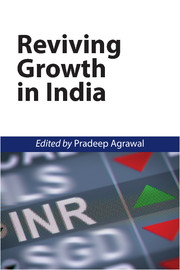Book contents
- Frontmatter
- Contents
- List of Tables and Figures
- Preface
- Section 1 The importance of growth
- Section 2 Reviving growth of industry and exports
- Chapter 3 Sustaining a High Rate of Industrial Growth in India in the Next 10 Years
- Chapter 4 Growth Drivers: ICT and Inclusive Innovations
- Chapter 5 Determinants of India's Service Exports
- Section 3 The dampeners to growth: Controlling inflation
- Section 4 The supply constraints to growth
- Section 5 Emerging issues in growth: The labour and capital markets
- Contributors
- Index
Chapter 4 - Growth Drivers: ICT and Inclusive Innovations
from Section 2 - Reviving growth of industry and exports
Published online by Cambridge University Press: 18 December 2015
- Frontmatter
- Contents
- List of Tables and Figures
- Preface
- Section 1 The importance of growth
- Section 2 Reviving growth of industry and exports
- Chapter 3 Sustaining a High Rate of Industrial Growth in India in the Next 10 Years
- Chapter 4 Growth Drivers: ICT and Inclusive Innovations
- Chapter 5 Determinants of India's Service Exports
- Section 3 The dampeners to growth: Controlling inflation
- Section 4 The supply constraints to growth
- Section 5 Emerging issues in growth: The labour and capital markets
- Contributors
- Index
Summary
INTRODUCTION
Innovations are essential to raise productivity and sustain growth. Inclusion is also important to sustain growth, since it prevents possible political unrest, raises average productivity and expands the market size. Innovations using Internet and mobile communication technologies (ICT), especially, suit inclusion, and therefore, sustain inclusive growth, which is a major Indian objective. Inclusion and growth can go together if inclusion is of the type that facilitates growth. ‘Active inclusion,’ defined as creating conditions for the many to contribute to and participate in growth (Goyal, 2012), is of this type.
An inclusive innovation is one that creates products that can be accessed by all classes, improving their productivity, and are not restricted to the elite. This chapter develops a simple analytical framework that clarifies the conditions that foster inclusive innovation in Emerging and Developing Economies (EDEs). It brings out two ways of facilitating inclusion through innovation: first, to induce more technical change in products consumed by the less well off, thus, lowering costs for them and second, to make more resources available for them or reduce their transaction costs so that they can afford better products. Alternative ways of doing this are through income transfers or through better systems or public provision of the relevant infrastructure. The latter are suited to active inclusion.
The analytical framework shows that large market size stimulates innovation to profit from it, since adoption and further adaptation of technology responds to economic incentives. Increasing the market size creates broader incentives for innovation and reduces the need for direct government inputs that have been difficult to provide. Since market size strengthens private incentives for inclusive innovation, it is likely to improve outcomes.
Next, the chapter assesses India's telecommunication policy (2012) and policy changes towards mobile banking to examine the extent to which they have improved relevant infrastructure such as broadband, or taken steps to increase the market size.
- Type
- Chapter
- Information
- Reviving Growth in India , pp. 82 - 106Publisher: Cambridge University PressPrint publication year: 2015
- 2
- Cited by



